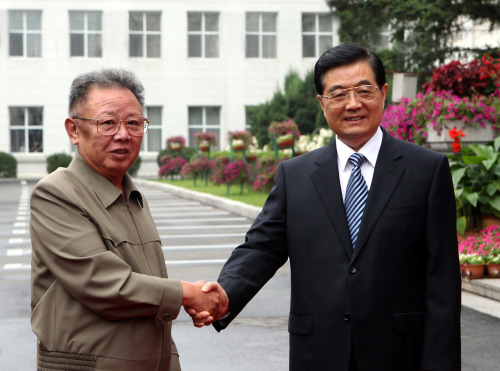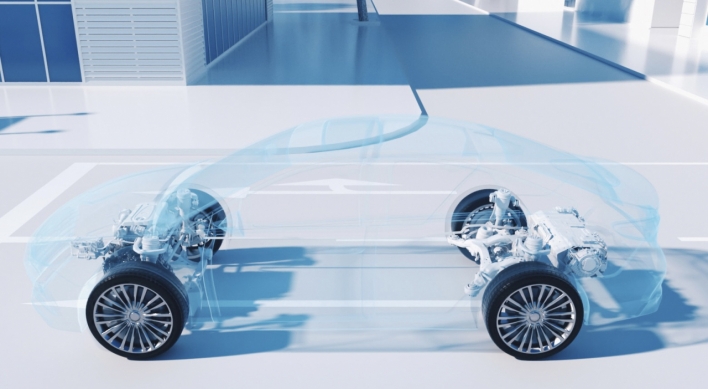As Chinese Premier Wen Jiabao told South Korean President Lee Myung-bak Sunday that Kim's trip, the third in just more than one year, is aimed at learning from China's market-oriented reforms, expansion of bilateral economic relationship and provision of additional economic aid to the poverty-stricken North appeared to be the dominant agenda at the summit held at the Great Hall of the People.

Kim's arrival in Beijing earlier Wednesday came after the reclusive leader toured various industrial facilities, including an auto plant, an electronics producer, a discount store and an IT company in northeastern and central eastern Chinese cities, such as Changchun, Yangzhou and Nanjing, over the past six days.
Details of the summit, let alone Kim's itinerary, have not been available as North Korea and China remain almost silent on his trip shrouded, as is typical, in secrecy.
Sources say that Kim and Hu held in-depth discussions on expanding the North-bound food aid, revitalizing economic cooperation and increasing Chinese firms' investment in the North, among others.
They note that a large number of Chinese leaders and ranking officials also attended a welcome dinner for Kim held after the summit talks. Indeed, Chinese State Councilor Dai Bingguo and Wang Jiarui, head of the International Department of the Central Committee of China's Communist Party, are known to have closely accompanied Kim on his Chinese trip that began last Friday, displaying deepening friendship between the two allies.
Kim's motorcade entered the Great Hall of the People at 5:30 p.m. (local time) and left at 8:45 p.m. for the Diaoyutai State Guesthouse, meaning the two leaders spent over three hours together at summit talks and dinner.
Earlier on Wednesday, the 69-year-old Kim arrived at the Beijing guest house after wrapping up a 19-hour ride through China's eastern areas from Nanjing aboard his special train.
In accordance with a long-standing custom, Kim is believed to have already held talks with Premier Wen shortly after his arrival at the Diaoyutai. The North Korean leader is expected to leave for Pyongyang Thursday.
he North has vowed to become a prosperous country by 2012, but it is still struggling to feed its people amid a nuclear standoff with the United States, South Korea and other regional powers.
The nuclear row keeps the United States from normalizing ties with the North, which is under U.N. sanctions over its nuclear tests in 2006 and 2009. That hindered Pyongyang's efforts to attract outside investment, a key to improving the economy.
Against the backdrop, the North is seeking to boost economic cooperation with China, the North's last remaining ally and benefactor.
Among a number of projects under discussion, the two neighbors plan to turn an island in the Yalu River on their border into an industrial complex.
Still, Kim was expected to touch on the sensitive issue of his hereditary power succession plan to try to win endorsement from China, said the sources.
Kim, who inherited power from his late father and North Korean founder Kim Il-sung, has taken steps to extend his family dynasty into a third generation since he suffered a stroke in 2008.
He named his youngest son, Jong-un, vice chairman of the Central Military Commission of the North's ruling Workers' Party and a four-star general last year in the clearest sign yet to make him the next North Korean leader.
The summit came five days after Kim crossed the border and toured major cities in China's northeastern and southeastern areas on what appears to be a study tour of China's vibrant economy.
Hu indirectly urged Kim to open his isolated country during their previous summit held in the northeastern city of Changchun last August.
Kim has so far visited an automaker, IT companies, a solar energy company and a large discount store as well as a top electronics company as he traveled about 5,000 kilometers across China's northeastern and southeastern regions before reaching Beijing.
China has repeatedly pressed its impoverished ally to follow in its footsteps in embracing the reform that lifted millions of Chinese out of poverty and helped Beijing's rise to the world's second-largest economy.
North Korea appears to be concerned that outside influences associated with reform and openness could undermine its control on its 24 million people and eventually pose a threat to its regime's survival.
North Korea's dependence on China for diplomatic and economic aid has been on the rise amid its isolation from the international community over its nuclear ambitions. The North conducted nuclear tests in 2006 and 2009, drawing international condemnation and U.N. sanctions.
On Tuesday, the United States said it imposed sanctions on a North Korean firm and 15 other foreign firms for trading equipment and technology for the production of weapons of mass destruction.
The trade volume between North Korea and China stood at US$3.46 billion in 2010, up from $2.68 billion in 2009, according to South Korea's Unification Ministry, which handles inter-Korean affairs.
Kim's ongoing trip is likely to serve as a litmus test on whether it is serious about reform and openness.
The North's experiment with limited reforms backfired in recent years, deepening the country's economic woes with no relief in sight anytime soon.
In March, the U.N. food agency appealed for 430,000 tons of food aid to feed 6 million vulnerable North Korean people, a quarter of the country's population.
Robert King, the U.S. envoy for North Korean human rights, is visiting North Korea to assess the North's food situation, a possible indication of the resumption of food aid to the North.
The summit also comes amid no signs of progress to resume long-stalled talks aimed at ending Pyongyang's nuclear weapons programs. The talks involve the two Koreas, the United States, host China, Russia and Japan.
The North has expressed its willingness to rejoin the nuclear talks that it quit in 2009, but Seoul and Washington demand that Pyongyang first demonstrate its denuclearization commitment by action.
Seoul also wants Pyongyang to apologize for its two deadly attacks on the South last year.
(한글기사)
북중 정상 경협, 후계구도, 한반도 비핵화 등 논의
(베이징=연합뉴스) 김정일 북한 국방위원장과 후진타오(胡錦濤) 중국 국가주석이 25일 베이징(北京) 인민대회담에서 3시간이 넘는 정상회담과 만찬을 했다.
이날 오후 5시 30분(한국 시간 오후 6시 30분) 즈음에 시작된 정상회담은 1시간 30분가량 진행된 것으로 알려졌으며, 이후 김 위원장과 중국 수뇌부는 만찬을 갖고서 오후 8시 45분께 인민대회당을 빠져나왔다.
김 위원장 일행은 의전차량 편으로 다시 댜오위타이(釣魚臺)로 돌아왔다.
앞서 이날 오전 9시께 베이징역에 도착해 댜오위타이에서 여장을 푼 김 위원장은 의전차량 편으로 인민대회당에 오후 5시를 넘겨 도착해 정상회담 수순에 들어갔다.
지난해 5월 방중 때에는 김 위원장과 후 주석이 정상회담과 그에 이어 만찬을 했으며, 여기에 4시간 30분이 소요됐었다.
정상회담에서는 우선 두 정상이 각각 자국의 사정을 소개하면서 상대국을 칭찬하는 절차를 거친 것으로 알려졌다.
이 자리에서 김 위원장은 경제시찰을 통해 본 중국 개혁개방의 눈부신 성과를 극찬하고, 후 주석은 북한이 최근 적극적으로 나서는 개혁개방 노력을 높이 평가하는 식으로 화답한 것으로 전해지고 있다.
두 정상은 이어 북중 경협, 북한 후계구도, 북핵 6자회담, 국제 및 지역 문제 등을 논의한 것으로 알려졌다.
이 가운데 김일성-김정일-김정은으로 이어지는 북한 후계구도 문제와 관련해서는 중국이 3대 세습에 맞장구친다는 국제적 비난을 우려하는 기색이고, 이와는 달리 북한은 중국의 분명한 지지를 요구한다는 점에서 논의가 쉽지 않았을 것으로 예상된다.
이와 관련해 북중 정상 차원에서 직접적인 언급을 하지 않았다는 관측도 나온다.
특히 중국 수뇌부가 정상회담에서, 후 주석의 특사 격으로 지난 2월 13∼15일 방북했던 멍젠주(孟建柱) 국무위원 겸 공안부장이 김 위원장과의 면담에서 했던 북한 후계구도 인정 발언 이상의 언급을 했을지에 관심이 모아지고 있다.
정상회담에는 그간 관례로 볼 때 중국 측에서 시진핑(習近平) 부주석, 다이빙궈(戴秉國) 외교담당 국무위원, 왕자루이(王家瑞) 공산당 대외연락부장 등이, 북한 측에서는 최태복 당비서, 강석주 내각 부총리 등이 배석했을 것으로 관측된다.
정상회담후 만찬에서는 해외순방중인 우방궈(吳邦國) 중국 전국인민대표대회(전인대) 상무위원장을 제외한 대부분의 정치국 상무위원들이 참석한 것으로 전해졌다.
베이징 현지에서는 김정일 위원장이 후진타오 주석과의 정상회담에 앞서 댜오위타이에서 원자바오(溫家寶) 총리와 별도로 정상회담을 했을 것이라는 관측과 더불어 26일 오전 회담후 오찬 회동이 있을 것이라는 추론도 제기되고 있다.
김 위원장은 이전 베이징 방문에서도 후 주석과 정상회담을 하고서 원 총리와는 따로 정상회담을 해왔다. 이는 중국의 '독특한' 정치체제에 따른 것으로, 국무원 수반인 원 총리가 정부를 대표하기 때문이라는 지적이다.








![[Kim Seong-kon] Democracy and the future of South Korea](http://res.heraldm.com/phpwas/restmb_idxmake.php?idx=644&simg=/content/image/2024/04/16/20240416050802_0.jpg&u=)









![[Today’s K-pop] Zico drops snippet of collaboration with Jennie](http://res.heraldm.com/phpwas/restmb_idxmake.php?idx=642&simg=/content/image/2024/04/18/20240418050702_0.jpg&u=)